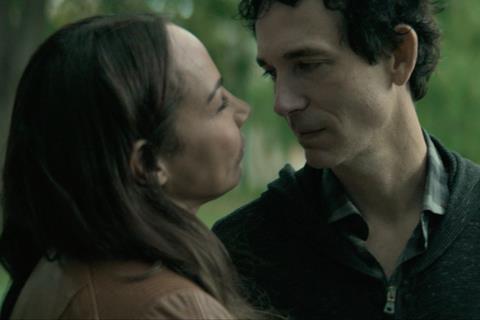Dystopian melodrama from Canada uses improvised acting to explore a global pandemic

Dir. Jeremy LaLonde. Canada. 2022. 92 mins.
In the very near future, a water-based global pandemic has already wiped out 60 percent of the world’s population, and the rest of the human race is on borrowed time. Research scientist Jennifer is humanity’s best hope to devise a solution to what has become known as “The Great Paradox”: drink too much water, and die from the effects of the virus; drink too little and die from dehydration. But the pressure is getting to Jennifer (Amanda Brugel), and on the orders of her boss, she takes a weekend break with her husband (Jonas Chernick) at their second home in the country. It becomes clear, however, that there is more going on than a spot of rest and recuperation. Tonally, this laboured psychological drama is an odd mismatch – a kind of dystopia-meets-soap-opera collision. In terms of the storytelling, it fails to cultivate enough of a sense of early mystery to justify its reliance on extensive third act exposition.
A kind of dystopia meets soap opera collision
Ashgrove reunites director and co-writer Jeremy LaLonde with star, co-writer and producer Jonas Chernick who worked together on James Vs His Future Self. An unusual methodology was employed in the making of this latest film – it was shot chronologically, using an outline which was kept from the actors, who were required to improvise based on their character’s back story and their scenes so far. This should be a selling point for further festivals, where the risky approach will be of interest to cine-literate audiences. It does, however, bring a degree of inconsistency to the performances and an edge of panic to some of the scenes. And given current audience resistance to pandemic-themed projects, Ashgrove may find it hard to make a wider impact.
Early in the film, a weeping Jennifer experiences a breakthrough in her bathroom. Jubilant, she calls her boss, asking him to summon the entire team. But she doesn’t make it to the laboratory. The next scene shows her waking, befuddled, after suffering from a stress-induced blackout. Several days of memories are missing. This is clearly a worry for, well, the entire planet. Jennifer is the sharpest mind working on what could be a mass extinction event. An enforced weekend break seems the very least her bosses can do in the circumstances. Jennifer and Jason head to the country, while on the soundtrack, some very literal lyrics explain the situation further.
For a while at least, it’s as though there isn’t a threat to the future of human life on the planet (pandemic dread and collective despair are notably absent throughout the film). The pair kayak together, argue over his new hobby: ukulele improv. They ration their water intake; potter around the farmer’s market. But Jennifer starts to notice that Jason is unusually uptight about food, and that he is sneaking off for covert phone calls. A tense dinner party with friends further hints that he is keeping secrets. But what Jennifer couldn’t possibly anticipate is how entwined are her marital issues and the eventual fate of humanity. And Jennifer’s confusion is not in the least surprising: the whole premise is increasingly far-fetched, requiring laborious explanation from a supporting character in order to coax the story to its conclusion.
Production companies: Banana-Moon Sky Films, Peter Harvey Productions, Cryingman Production
International sales: Jonas Chernick, jonaschernick@rogers.com
Producers: Jeremy LaLonde, Jonas Chernick, Peter Harvey
Screenplay: Jeremy LaLonde, Jonas Chernick, Amanda Brugel
Cinematography: Robert Scarborough
Editor: Jeremy LaLonde
Production design: Jess Craymer
Music: Ian Lefeuvre
Main cast: Amanda Brugel, Jonas Chernick, Shawn Doyle, Natalie Brown, Christine Horne, Sugith Varughese















![[L-R]: Amanda Villavieja, Laia Casanovas, Yasmina Praderas](https://d1nslcd7m2225b.cloudfront.net/Pictures/274x183/6/4/1/1471641_pxl_20251224_103354743_618426_crop.jpg)








